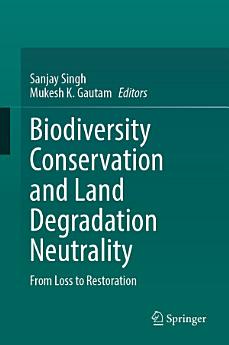Biodiversity Conservation and Land Degradation Neutrality: From Loss to Restoration
About this ebook
Ecosystem diversity and its health directly influence land productivity and its range of ecosystem services. Achieving land degradation neutrality is crucial for restoring and reinforcing biodiversity's structure and function, which ultimately plays vital role in building climate resilience. To substantiate these ideas, this book presents practical case studies and exemplifies best practices in plant, animal and ecosystem conservation. It prominently highlights the intricate interplay of complex drivers behind land use, land use change, and land degradation. It also examines the direct consequences of land degradation on biodiversity and explore global efforts, frameworks, and strategies crucial for achieving land degradation neutrality. Furthermore, it integrates indigenous knowledge, policy framework and community engagement as instrumental components for achieving global targets related to sustainable land management.
This book accentuates the significance of terrestrial ecosystems in achieving biodiversity goals outlined in SDG 15, Life on Land, through a multidisciplinary approach and contributions from academicians, policymakers, United Nations Organizations, and subject matter specialists. Thus, it is a resource for students, trainees, and researchers, providing them with knowledge and insights about significance of land degradation, land degradation neutrality, and biodiversity conservation.
About the author
Dr. Sanjay Singh obtained a PhD in Botany from Hemvati Nandan Bahuguna Garhwal University, India. Currently, he is working at the Center of Excellence on Sustainable Land Management (CoE-SLM), Indian Council of Forestry Research and Education, India. The establishment of the CoE-SLM was announced during the 14th Conference of Parties (COP-14) of the United Nations Convention to Combat Desertification, India and Dr. Singh played a pivotal role as one of the key scientists who worked towards the establishment of the Center at the Indian Council of Forestry Research and Education, India. As a member of Team India for the Environmental Sustainability Working Group of the G20, he was also involved in the publishing of G20 Presidency documents. He was also part of the Indian Delegation to UNCCD, COP-16. Before this, Dr. Sanjay was a scientist at the Tropical Forest Research Institute, India, where he worked extensively in the forests of central India, with a primary focus on issues related to biodiversity characterization and its conservation. He has over 50 research publications in the field of biodiversity, ecosystem ecology, plant ecology, climate change, and land degradation. His current work is aligned with the Global Biodiversity Framework and Sustainable Development Goal 15-UNEP (SDG-15).
Dr. Mukesh K. Gautam is an ecosystem ecologist and biogeochemist, with a PhD in ecology and environmental science from Forest Research Institute, India, followed by postdoctoral experiences from Indian Institute, India and Korea Basic Science Institute, South Korea. In more than two decades of his academic career, he has conducted collaborative research on ecosystem ecology and vegetation ecology, biogeochemistry of forested ecosystem, stable isotope ecology, ecohydrology, soil science and element dynamics with the aim to understand and reinforce the knowledge and prediction about the ability of ecosystems to provide important services and maintain biodiversity. In his research and academic journey, he has authored and published 38 research articles in various influential and prestigious peer-reviewed journals. As an integral part of the science dissemination and peer-review system, he regularly serves as a guest reviewer for various scientific journals across a wide range of scientific disciplines. Currently, he is an assistant professor at the biology department, Medgar Evers College (CUNY), New York, where he teaches different courses related to general biology including ecology and conducts research in broader framework of ecosystem analysis.






